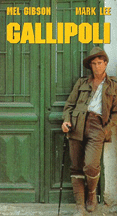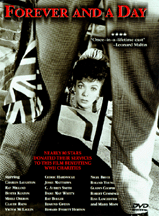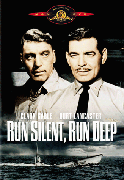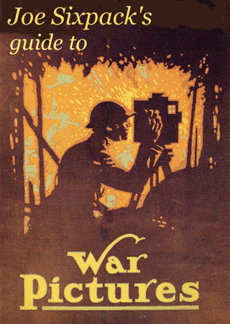
"All Quiet On The Western Front" (1930, Universal)


A powerful indictment of the tragedy of WWI, as seen through the experience of a German squadron, drawn from an elite German school. The bright-eyed enthusiasm and esprit de corps of the youthful recruits is relentlessly ground down under the weight of bombardments, starvation, grime, bloodshed and indifference. As the film's hero, Paul, declares in his famous speech at the film's end, dying for one's country isn't glorious -- "it's dirty and it's painful." Beautifully shot in black and white, this film slowly, mercilessly, artfully rachets up the tension, with battle scenes and psychological dramas that are literally and figuratively gut-wrenching. This celebrated film, made a decade after the end of the First World War, summed up the disillusioning pall the war cast upon its generation with much the same cathartic power as the movie Platoon would, more than half a century later. It's pretty strong stuff, surprisingly so for the time; an early talkie, it suffers soundwise in scenes with dialogue, but is crushingly powerful in its use of battlefield sound effects. Lew Ayres, who plays Paul, is both magnetic and intense, as his Leonardo Decaprio baby face hardens into an anger-filled John Wayne-ish mask. Although this film established many of the conventions of the war genre, it did so unsentimentally, thus escaping the cliched feel of its many imitators.

"Gallipoli" (1981)


One of the great antiwar films made in the post-Vietnam War era. This is a sensuous, elegaic look back at the tragedies of World War I, as seen from the vantage point of the colonially-minded Australians, who rushed to enlist in Britains defense against the rapacious Hun, only to discover that the English could treat them as poorly as they did the Irish, East Indians and other little people. The battle of Gallipoli, in Turkey's Suvla Bay, is one of the great examples of the military mind working at its worst. Thousands of young Australians were thrown at an unconquerable position as British troops were being held back in the rear, being saved for another engagement which, unbeknownst to the ramrod commanders, had already been won. Communication lines had been cut, and runners sent to relay messages from field commanders were unable to reach the higher-ups in time to prevent the disasterous final charge. Typical of director Peter Weir, most of this film is devoted to the set-up, and little to the slaughter... For some reason this gives the film more emotional oompf than your standard-issue shoot-em-up war flick. Plus, this is pretty much the only film in which I can concede the much-vaunted sex appeal of blue-eyed Aussie studmuffin, Mel Gibson. He's pretty adorable portraying a young back country ne'er-do-well, reluctantly drawn into the war by his wide-eyed patriotic pal, played perfectly by the perky, incandescent Mark Lee. (By the way, whatever happened to Lee? This seems to be about the only film of note he ever starred in... How odd.) A good film, and painfully historically accurate.

"The Dawn Patrol" (Warner Brothers, 1938)

An outstanding -- and rather bleak -- war movie, featuring Errol Flynn and David Niven as two dashing but harrowed, hard-drinking WWI fighter pilots, whose front-line unit is a constant revolving door of fresh-faced "replacements," new cadets who lack the basic skills to keep them alive for even a day or two, against the seasoned German pilots based only miles away. Basil Rathbone plays the British base's high-strung commanding officer, who feels every death as a personal blow -- following heartless orders, he sends boy after boy to an inevitable death. The tables turn when his promotion comes in, elevating the hotheaded and resentful Flynn to his position as commander, and Flynn's grief takes on an added dimension, as he becomes the one responsible for issuing the orders that transform eager young men into mere cannon fodder. The film is a typical interwar mix of pacifist-tinged pessimism and old-world chivalry: the men are gallant and brave, but resentful of the higher-ups who created and orchestrate the wars they have to fight in. The script is fascinating, with the action of the first half taking place entirely on the base. Rather than see the aerial combat, we see the psychological after-effects of the heavy personnel losses. When we do see combat, it is deflationary, either a framework for tragedy or a curse disguised as a giddy triumph. It's also well presented: the feel of the ungainly, canvas-clad prop planes that men went to war in is made palpable, as the ricketty machines bounce along the runway and sputter to life in the skies. A very good film, definitely worth watching.
"The Real Glory" (MGM, 1937)


This pre-WWII action film has an eerie feel in a post-September 11th world, as Gary Cooper plays an Army doctor contending with Muslim fanatics in the Philippines -- including grim assassins who attacked the Army leaders in suicide missions that they believed would send them to heaven, with the blessing of Allah. Besides the creepy timeliness, this is also a gripping action film; raw, realistic and well-paced... Fascinating movie, even if its historical accuracy is somewhat questionable.
"The Spy In Black" (1939)

An early British WWII film, featuring Conrad Veidt as a German naval officer, afoot on a sinister mission in the Northern UK. This film was apparently the first pairing of director Michael Powell and producer Emeric Pressburger; the plot is pretty thin, but has a few interesting, offbeat Powell-ian moments, including a great comedic scene when Veidt's cover is blown and he takes control of the situation. Interesting to see how, at this early stage in the war, the German baddie was still allowed the trait of military honor.

"Forever And A Day" (1943)


An amazing parade of British and American actors and international directors (including Rene Clair) lend rich, understated performances to this wartime morale booster. The destiny and spirit of England is viewed through the prism of a single country house which over the decades has become engulfed and reshaped by the bustling, energetic boundaries of London. The Trimble family fortune rises and falls, gives way to waves of modernity, and finally confronts the German Blitz, where the old family manor shelters dozens of plucky Brits in its bomb shelter basement. They sing old music hall songs as the bombs fall from above, and our present-day heroine recounts the tales of the generations of her family that have lived in the house in years gone by. Merle Oberon, C. Aubrey Smith, Ray Milland, Claude Rains, Una O'Connor, Elsa Lanchester, Brian Aherne, Reginald Owen, Edward Everett Horton, Buster Keaton and Gladys Cooper are among the dozens of celebrities who flit across the screen in well-placed cameos and episodic roles. Charles Laughton gets a brief, underwhelming role as a besotted butler (a nod, perhaps, to his great role as Ruggles Of Red Gap...) Although over a dozen writers worked on the script, and although its sentimental message (about British courage and pluck) is a bit predictable, this is an entirely effective, charming, and cohesive work... Plus... geez, when are ya ever gonna see a cast and crew like this again? A fine film, of historical and artistic interest -- well worth checking out!
"A Canterbury Tale" (1944)
Director Michael Powell revisits the Blitz in this odd WWII-era interpolation of Chaucer's classic tale of travelers meeting on the path to the famous cathedral town... An interesting and unusual look at English rural life, and a quick glimpse at how day to day life in the countryside was affected by the war. With a typically offkilter, Powell-ian slant on the action.... don't worry, it all comes together in the end.
"Green For Danger" (1947)

The German "Blitz," or air war is seem briefly at the start of this mildly wacky British thriller, set during the war, and filled with odd little turns. The Inspector who shows up to solve the case (which was pretty simple) is a Kooky Character, sort of a forerunner of the BBC-TV detectives of decades to come (or a pallid echo of Poirot; take your pick...)
"The Lion Has Wings" (1940, United Artists)

An effective and explicitly propagandistic wartime docudrama, co-directed by the ever-quirky Michael Powell, and clearly aimed at a hometown audience seeking reassurance during the ongoing German Blitz. Merle Oberon and Ralph Richardson star as a British couple doing their bit to beat back the Hun, but in truth the acting parts are the least noteworthy aspect of this feature-length film, which is structured more like a newsreel than a drama. The opening sequences, which feature a clever montage that juxtoposes the wholesome, modern look of freedom-loving England with the sinister, humourless world of the Nazis, has some great footage and several interesting aspects. The apparent faith in modernity (as extolled in the newly-built high-rise tenements and lengthy footage of wartime industrial production) and the uniquely Powell-ian sense of humor which frames the narration are equally of note... The second half of the film involves a recreation of an early RAF bombing raid on the mainland, and a lengthy dramatization of how the Brits would fend off German bombers through a combination of ground artillery and plane-to-plane dogfights. The film was probably also meant to act as disinformation: we are shown an elaborate, James Bond-ish, secret control center which coordinates information phoned in by local "plane watchers," when in fact Britain had already developed a radar defense, which proved key to their success in controlling the airspace over the English Channel. Likewise, there is no mention of the controversial "lend-lease" arrangement, set up with the nominally-neutral United States, which had not yet joined the war. Finally, this pro-RAF film proved to be rather prophetic, as it was produced and released just before the airborne Battle of Britain, which was one of the pivotal fights of the War. A fascinating and somewhat quaint bit of wartime propaganda.

"Tora Tora Tora" (20th Century Fox, 1970)


A detailed look at the myriad miscalculations and complacencies that lead to the resounding success of the Japanese attack on Pearl Harbot. This dramatization of the December 7th saga concentrates on the diplomatic and espionage efforts of the Americans, and the internecine political struggles of the Japanese high command, coupled with their military brilliance and the sheer luck they encountered attacking Hawaii. Most remarkable is the even-handedness with which this film presents both sides of the story, and exposes the follies of both military groups (Japan in making an attack that provoked American mobilization, and the USA for ignoring their not-so-subtle intentions). It's a pretty good narative, although all the characters are strictly defined by their jobs, and there's little exploration of their personalities. Cool historical film, though... worth checking out!
"The Wings Of Eagles" (MGM, 1957)


John Wayne stars in this sluggish war-related Technicolor bioflick profiling Navy aviator-cum-Hollywood screenwriter Frank Wead, who (apparently) was influential in developing naval strategy before and during WWII... It's not gripping or as grim as Ford's similarly reverential "They Were Expendable," but it works in its own way. Dan Dailey steals scene after scene as Wayne's salty Navy sidekick, as does Ward Bond who has a delicious role as John "Dodge", lampooning the director himself, who apparently brought Wead to Hollywood. Maureen O'Hara does her Hepburn-y best as Wead's long-suffering wife. Of particular interest, plotwise, is the depictation of her as a boozy, chainsmoking modern gal, as well as the lengthy exploration of Wead's struggle to overcome a severe physical disability, which kind of undercuts the smothering machismo of the pre-feminist military world. Nice use of stock footage, too. Not Ford's best, but he definitely makes it better than it would have been otherwise.
"Star Spangled Rhythm" (Paramount, 1942)


For the lighter side of war, the enthusiasm and optimism of WWII-era America is seen in this wartime comedy which features Bing Crosby crooning the closing number. This is a flimsily-scripted wartime tossoff in which Paramount Studios hosts a patriotic all-star revue to entertain our men in uniform. Eddie Bracken is a goofy sailor back home to get a girl... Lucky for him that Betty Hutton -- in her first major role -- has her eyes set on him as well. A receptionist at the studio's switchboard, she fast-talks and finagles to get Bing Crosby, Bob Hope, Fred MacMurray and a bunch of other stars to come on board for the (spontaneous, yet amazingly elaborate) really big show, and in the process gets her man. Bing's big patriotic number at the end, which is some of the clumsiest wartime propaganda committed to film.
"When Trumpets Fade" (1998)
This made-for-cable WWII shoot-em-up came out around the same time as Spielberg's Saving Private Ryan, and while it lacks the artistic depth of that film, it does give some nice glimpses into the visceral horror of on the ground warfare. The focus is the bloody and all-but-forgotten fight over Germany's Hurtegen Forest, described in the soldiers in the film as "the Death Factory." Our hero is a self-serving survivor whose talent for combat leads to several unwanted battlefield promotions -- and, of course, to a restoration of his deadened sense of humanity and heroism. The forced modernism of the script -- particularly the gratuitous cursing and '90s-ish performances -- threaten to upend the film in the opening sequences, but it gathers steam and a sense of dread. Worth checking out. The only real gaping hole is country singer Dwight Yoakam's dull, scenery-chomping cameos as a bullet-headed, unsympathetic officer. It's not that bad of a performance, but I really think Dwight should re-think this whole acting career thing: his charisma doesn't translate well on screen.

"The Story Of G. I. Joe" (Lester Cowan Productions, 1945)


Burgess Meredith is perhaps a little too beatific in his portrayal of war correspondent Ernie Pyle, the much-beloved Pulitzer Prize winning war correspondent who brought the stories of everyday American soldiers home to readers back in the States. The Army infantrymen revered Pyle the way they loved cartoonist Bill Mauldin, who also had the guts and humility to slog it out in the mud with them, and let the folks back home know how they met the war with an all-American mix of grit, fatalism and good humor. The production values of this movie, with distracting backdrops and obviously artificial studio sets, don't hold up that well in comparison to the hyper-real war flicks that came in its wake, yet few movies have captured just how grubby, desolate and miserable the day-to-day lives of the ground soldiers could be. Also, an extended battle sequence filmed in the real-life rubble of a recently "liberated" Italian town is remarkable for showing just how extensive the war damage was -- it was total warfare, and it's amazing that Europe ever recovered from the devastation. A surprisingly bleak, if somewhat episodic, story, framing an iconic, groundbreaking war movie against which all others have to be measured. (One note of complaint: the DVD version has shamefully little in the way of special features, just one brief clip of the real Ernie Pyle taping a news reel interview with a couple of G.I.s saying "hi" to the folks back home, and a series of illegible reproductions of old newspaper columns under his byline... It's really inexcusable that a full-length documentary about Pyle and his reporting was not also included... Oh, well. It's still a good film.)

"Run Silent, Run Deep" (MGM, 1958)


A superior war film, and one of the prototypical submarine movies. Burt Lancaster and Clark Gable lock horns as the ranking officers on a WWII submarine slated for duty in the Pacific theater. Lancaster has been the ship's captain for years and has the respect of the crew, but he is abruptly displaced by Gable's Captain Richardson, a near-washout who is obsessed with breaking a Japanese blockade of a vital sea lane, after having lost his own ship there the year before. The personal tensions and resentments between the two officers are complicated by the grumblings of the crew, and by differences in naval tactics: Gable runs the crew ragged practicing for a dangerous new tactic that he's convinced will defeat the Japanese, and the sailors appeal to Lancaster for relief. A fascinating look at the frayed edges of military discipline, with a taut, well-directed script and good B&W cinematography. The shots of the exterior of the submarine are particularly nice: here's a film that lets us see how boatlike submarines actually are: you feel like you're actually up on deck, looking at every rivet and welding seam. If you go for this kind of movie, this one's hard to beat.
"The Longest Day"

"It Happened Here" (1966)


The banality of evil is amply dramatized in this creepy English "what if" story, which tells the hypothetical story of what happened to Great Britain after the (fictional) defeat at Dunkirk, and subsequent triumph of the British blackshirt movement. Propaganda techniques and Nazi philosophy are skillfully shown at work in a German-run, wartime London. The ideology itself is less terrifying than the easy, matter-of-fact way that the characters adopt it, an entirely plausible and horrifying pragmatism which meant to mirror the German experience and project it onto a nation supposedly immune to the lure of totalitarianism. If this independent film had been made in today, it could be subtitled "England's Willing Executioners..." As deceptive on as many levels as the movement it depicts, this is a genuinely horrific, economically rendered movie, worth checking out, lest we be doomed to repeat the lessons of pseudo-history.
"The Steel Helmet" (1951)
Even though it was directed by the great Sam Fuller, this low-budget, psychologically-oriented Korean War movie lacks emotional oomph, and isn't really that big in the bang-pow department either. Gene Evans stars as a prototypical cigar-chomping battle-hardened infantry sargeant who dodges a particularly grim death as the movie begins. Soon, the grizzled loner hooks up with a rag-tag outfit populated with various Characters: the loyal Asian American, the loyal American Negro, a couple of colorful goofballs and an officer he (naturally) has to lock horns with until combat brings mutual respect. It's a potboiler, and along with the cheap production values, isn't terribly engaging. The plot perks up mildly when a Red Chinese prisoner tries to needle his captors -- particularly on civil rights issues -- but the politics of the script are a bit muddled, and neither the Asian or the African-American soldiers manage to effectively explain their loyalty to the old Stars and Stripes. Of some interest historically, but not a very good film.
"Pork Chop Hill" (MGM, 1959)


A grim but macho look at trench warfare in the 1950s... Gregory Peck leads his troops up a worthless hill during the waning days of the Korean War, in a tragic pissing contest with the Red Chinese. There's a redemptive message tagged onto the end (that we proved to the Reds that Americans have what it takes to stand up to their aggression), but this is a pretty bleak and despondent presentation of modern warfare... somewhat in keeping with other contemporary depictations of the Korean War -- the conflict where the phrase "War Is Hell" really stuck. Notable for the additions of Asian and black characters in the de riguer multi-ethnic squadron. The Japanese-American second in command is particularly welcome, although the cowardly African-American deserter is a bit more troublesome. Attempts to tie his character in with civil rights concerns don't help much. Best lines of the film: "Where's that 'pushbutton war' we've heard so much about?" "We're the pushbuttons..."
"Cast A Giant Shadow" (MGM, 1966)


A good war film, about the creation of the modern Israeli army and the creation of the state of Israel. Kirk Douglas plays a recently demobilized American military expert who returns home from WWII only to find he still has fighting and wanderlust in his blood. A cloak-and-dagger offer to help train the beleagured Jewish militias is all he needs to tell his wife, "honey, I'll write you soon!" and zip off to the promised land. The film is very one-sided and romanticized, yet compelling... In retrospect, historians have argued that the Israelis weren't as badly outgunned in 1948 as the official version implies, but I'm sure it was still bad enough. Guest appearances by John Wayne, Frank Sinatra (who phoned in role as a happy-go-lucky fighter pilot) and Yul Brynner make this a bone fide Epic Film, but you might find your attention wandering more towards the Sophia Loren-alike Senta Berger, who plays Kirk's Israeli love interest. History and war buffs will find this an entertaining and engaging film; jihadists and moral relativists might want to skip it.












